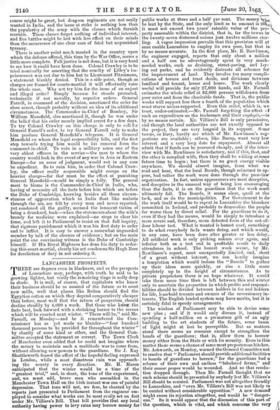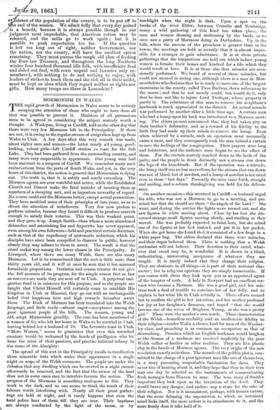LANCASHIRE PROSPECTS.
THERE are degrees even in blackness, and so the prespects of Lancashire may, perhaps, with truth be said to be growing lighter, but verily the remaining tinge is sadly deep in shade. It is well, of course, that capitalists who know their business should be so assured of the future as to erect new mills, well that places like Bolton should find the Egyptian cotton on which they depend comparatively cheaper than before;most well that the return of pauperism should decline steadily by 4,000 a week. But those who knit. the facts best, look forward with a shrinking horror to the scenes which will be enacted next winter. "There will be," said Mr. Farnall, on Monday—and be it remembered the Com- missioner has as yet made no blunder—" four hundred thousand persons to be provided for throughout the winter" by charity of some kind or other, and the General Com- mittee accepted the statement as correct. The Town Clerk of Manchester even added that he could not imagine where the money to maintain such a multitude was to come from, without allowing new powers to the guardians. Sir J. Kay Shuttleworth feared the effect of the hopeful feeling expressed in London, while a most disastrous ruin was approach-
ing the county in every direction. Mr. H. Mason anticipated that the winter would be a time of the "greatest trial," and, in short, the tone of the experienced, and, we must add, brave men who assembled in the Manchester Town Hall on the 15th instant was one of painful depression. That tone will not, we fear, be cheered by the reports just presented to Parliament from the engineer em- ployed to consider what works can be most ersily set on foot under Mr. Villiers's Bill. That bill provides that any local authority having power to levy rates may borrow money for
public works at three and a half per cent. The money he, be lent by the State, and the only limit as to amount is t L...., it must not exceed two years' rateable value of the pro.... perty assessable within the district, that is, for the towns its the twenty-seven distressed unions just -twelve millions ster- ling. A vague impression prevails that this provision will at once enable Lancashire to employ its own poor, but that is by no means accurate. In the first place, Mr. R. Rawlinson., the engineer engaged, reports that only about a million. and a half can be advantageously spent in very much-. needed works, such as draining, street-paving, and lay- . ing out parks, and he evidently distrusts all schemes for-
the improvement of land. They involve too many compli- cations of tenure and trust deeds, and divisions betweeu landlord and tenant, lessor and lessee. The work clearly useful will provide for only 27,000 hands, and Mr. Fin-nail estimates the whole relief at 82,000 persons withdrawn from-
poor-rates and from the charitable funds. That is, the public' works will support less than a fourth of the popuhition which must starve unless supported. Even this relief, which is, we trust, under-estimated,—Mr. Parnell forgetting the effect i f" such an expenditure on the tradesmen and their employes,—in by no means certain. Mr. Villiers's Bill is only permissive, and though the local authorities are not exactly opposed to-' the project, they are very languid in its support. Some • towns, as Bury, hardly see which of Mr. Rawlinson's sug-
gestions are available ; others, like Bacup, want very low interest and a very long date for repayment. Almost all admit that if funds can be procured cheaply, and if the inter- view with Mr. Rawlinson is satisfactory, and if this, that, and' the other is complied with, then they shall be willing at some future time to begin ; but there is no great energy visible- anywhere. We should almost imagine, from what we- read and hear, that the local Boards, though reluctant to op-
pose, had rather the work were done through the poor-law- organization. In fact, unless appearances are most deceptive, and deceptive in the unusual way of being less encouraging. than the facts, it is on the guardians that the work must- ultimately fall. The Boards, it seems clear, quail at the - task, and so do the municipalities. For Government to do the work itself would be to repeat in Lancashire the blunders - committed in Ireland, and probably to demoralize the people- far worse than by direct relief. For the guardians to do it, . even if they had the means, would be -simply to introduce it' more severe and, therefore, more detested form of the out-of-' door labour test. What is wanted is honest work, something-. to do what everybody feels wants doing, and which would; in any case, have been done after greater or less delay.-
All artificial work is only picking oakum over again, and inferior both as a test and in profitable result to daily attendance in school. The honest work seems, by Mr. Rawlinson's report, most unexpectedly limited, and, short of a grant without interest, we can hardly imagine a temptation which would induce the "Boards' to gather- up their ideas more quickly, or rise a little more completely up to the height of circumstances. As to' private proprietors there is no hope whatever. It would take them more time than is left between this and winter only to ascertain the proportion in which profits and responsi- bilities should be divided between holders in fee and holders- for life, leasehold tenants and owners of the reversionary in-. terests. The English landed system may have merits, but it is. certainly fatal to speedy arrangements.
The wisdom of Parliament may be able to devise some . new plan ; and if it would only discuss it, instead of spending a half-million on a premature gift of an ugly • building to the art students of the future, some beam of light might at last be perceptible. But as matter&.
stand there seems no resource except to strengthen the hands of the guardians; that is, allow them to borrow
money either from the State or with its security. Even in this,
matter there seems a chance of some most preposterous hitches.. Mr. Ashworth, on Monday, warned the General Committee not to resolve that "Parliament should provide additional facilities
to boards of guardians to borrow," for the guardians had a scheme of their own and endless "tabulated forms," and their amour propre would be wounded. And so that resolu-
tion dropped through. Then Mr. Parnell thought that no- such scheme should be presented by anybody lest Mr. Villiers's
Bill should be resisted. Parliament was not altogether friendly-
to Lancashire, and "even Mr. Villiers's Bill was not likely to be carried without considerable opposition." A new demand' might cause its rejection altogether, and would be " danger.- ous." So it would appear that the discussion of this part of the question, which is vital, and which con-ceras the very
st,ence of the population of ti county, is to be put off to e end of the session. We admit fully that every day gained is a benefit,- because it is always possible though in our judgment most improbable, that American cotton may be released, and the mills go to work again ; but it is
possible to push expectation too far. If the question is left too long out of sight, neither Government, nor the nation, nor the county, will have the smallest option remaining. They must pursue the rough old plan of feeding the Poor- law Treasury, and throughout the long Northern winter four hundred thousand idle folk, with insufficient food and doled out fuel, with rents unpaid and luxuries only re- membered, with nothing to do and nothing to enjoy, with leaders of strikes to teach them and the rich all in their midst, must be kept on alms which they regard neither as rights nor gifts. How many troops are there in Lancashire ?































 Previous page
Previous page